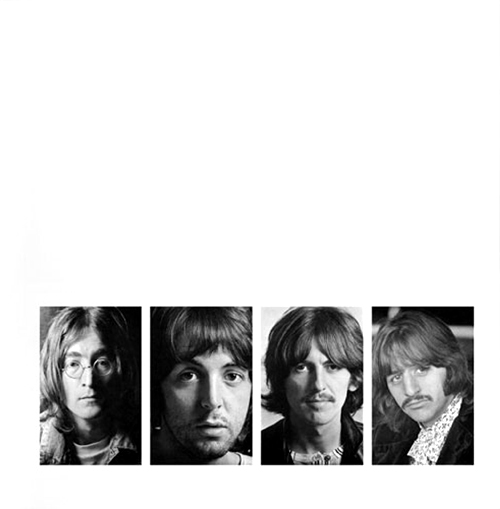The Beatles, a.k.a. The white album, contests the arbitrary distinction between popular music and political engagement through its radical eclecticism and self-reflexivity. The album outlines a new way of being political—a postmodern politics—that was and still is to a large extent erroneously seen as escapism.
Critics from the New Left charge that the disparate styles and self-conscious references on the record signal the Beatles’ disregard of politics; but this perspective implies that there is only one way of being political, and fails to consider the historical circumstances that give any use of parody its particular significance.
By 1968 corporate attempts to manipulate rock artists and fans were reaching a peak, and early rock and roll had lost much of its initially subversive allure. Concurrently, the Beatles found themselves lauded for their masterpiece, Sergeant Pepper’s Lonely Hearts Club Band.
The Beatles’ turn to parody then serves not as an escape from but as a specific response to key cultural tensions: the self-reflexivity and ironic appropriation of various styles on the album allowed the Beatles to contest the commodification of rock music even as they challenged assumptions about what constitutes political relevance.
This according to “We all want to change the world: Postmodern politics and the Beatles’ White album” by Jeffrey Roessner, an essay included in Reading the Beatles: Cultural studies, literary criticism, and the Fab Four (Albany: State University of New York Press, 2006, pp. 147–158).
Today is The white album’s 45th birthday! Below, documentary footage of the album’s creation.




Pingback: “Exile on Main St.” redux | Bibliolore
Consider the transition fro.m the 45 to the LP. What up with that? copyright 11/27/2013
While “pop” hits might have still dominated the charts, compared to the Brill Building and the A&R model days, the music industry was in disarray. The old model of presentation was broken. The “genius” who had Jimi Hendrix open for The Monkees had his head handed to him on a plate, It was only the few producers who allowed artistic freedom and gave up on the notion of a “hit” song that had any lasting success. So, to say the music biz was at it’s peak in selling the music to the public is just wrong.